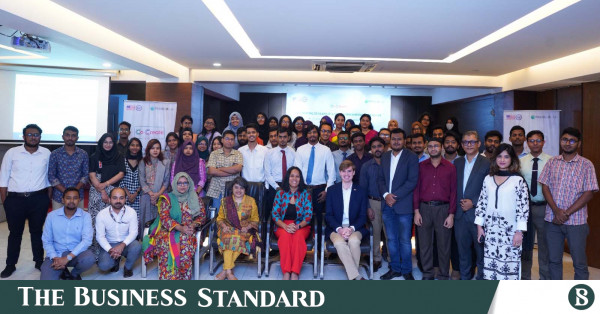Co-create 2071, a two-day bootcamp was organized at the University of Dhaka on October 2-3 by Preneur Lab on the occasion of the 50th anniversary of diplomatic relations between the United States and Bangladesh with the support of the American Embassy in Dhaka in association with the University’s Department of International Relations.
Lailufar Yasmin, Chairperson of the AU Department of International Relations, inaugurated the program with a keynote address followed by keynote address by key guest Sharlina Hussain-Morgan, Director of Public Engagement, Diplomacy Section Public, United States Embassy.
Ashraful Tanvir, Head of Operations at Preneur Lab, highlighted the importance of continuous learning and friendship between the United States and Bangladesh in shaping the next 50 years.
The bootcamp featured a rich range of offerings, including expert sessions, panel discussions, a policy recommendations workshop, awareness content creation, and engaging group activities. A total of 114 students from Dhaka University participated.
The first day of the bootcamp focused on the theme of innovation and entrepreneurship.
Sabera Anwar, Founder of GoDeshi, hosted an informative session on “Global Trends and Opportunities: Unlocking Entrepreneurial Potential”. Later, a roundtable discussion was held, bringing together personalities such as Almas Kabir, president of BMCCI; Taslima Miji, founder of Gootipa; Biplob Ghosh Rahul, founder of eCourier; Tajdin Hassan, CBO of the Daily Star; Mohammad Zaman, Head of Solution Architecture at Amazon; and Rashedur Rahman, associate professor at the University of Dhaka.
The second day was dedicated to the fight against climate change and environmental initiatives. Amir Hamza, a climate change activist, led a session focused on pressing climate issues in Bangladesh. Ahsan Rony, CEO of Green Saver, and Haseeb Irfanullah, independent research consultant on environment and climate change, engaged in a thought-provoking discussion with the audience.
The organizers expressed their intention to expand similar programs to other universities, providing future policy makers, especially young people, with the opportunity to connect with experts and engage in meaningful discussions.


